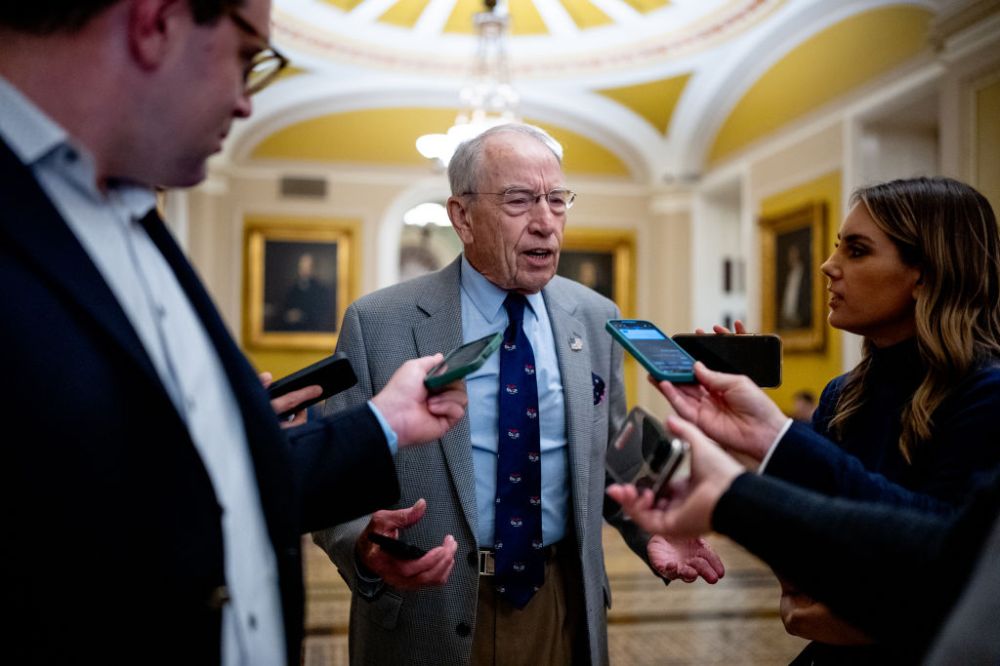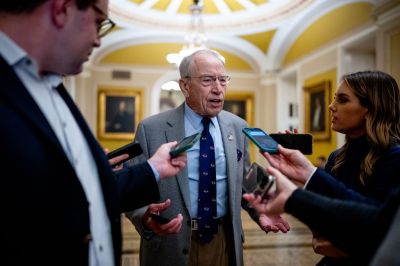We don’t do hot takes at The Dispatch, but I’ll confess to one that’s lukewarm: I’m coming around on Donald Trump’s scheme to use recess appointments to avoid the Senate confirmation process.
I still believe all of his nominees should be confirmed, to be clear. Americans voted for an authoritarian kakistocracy last month and they should have it. We owe it to democracy to run this experiment, for better or worse. And if it goes as badly as I expect, we’ll have the consolation of knowing that we deserve what we’ve gotten.
But if you’re still naive enough to care about civic norms, a case can be made that having Congress recess so that Trump can temporarily fill Cabinet positions with whomever he likes would be marginally less demeaning to the Senate than confirming his nominees would be.
Imagine you’re a Republican senator from a reliably red state like, oh, say, Iowa. You’re up for reelection in two years. Many a young, ambitious, amoral local GOP official is jealously eyeing your seat, watching intently in case you do anything to run afoul of Trump that might jumpstart a credible primary challenge. You wake up one day to find that his nominee to lead the Pentagon is one of the most comically unqualified candidates to lead a major department in American history. What do you do?
If you vote no, you’re out of office in two years. If you vote yes, you’ve betrayed your duty to ensure that the executive branch is led by competent, civic-minded officials whose highest loyalty is to the Constitution, not to the president; you’ve lent the prestige of Senate confirmation to a nominee who’s plainly undeserving.
So why not vote to adjourn instead, washing your hands of the matter and depriving that nominee of your vote yet staying on the right side of Trump by letting him get his way through the recess mechanism?
“Because that would amount to the Senate abdicating its ‘advice and consent’ duty,” you might say, “which would also be hugely demeaning and damaging to the chamber’s prestige.” Right, fair enough. But making Donald Trump president again was destined to be demeaning for everyone, including and especially officials in his own party. All we’re arguing about here, and all we’re going to argue about for the next four years, is which of several demeaning options before us is the least undignified.
If Senate Republicans are going to be browbeaten by two-bit online demagogues into rubber-stamping a kakistocracy against their better judgment, I think I’d prefer that the process be as dubious, illegitimate, and discrediting as possible. It would have the virtue of honesty, too: Since the right believes that Congress shouldn’t restrain Trump in any way, letting him appoint nominees autocratically through recess-appointment chicanery while the Senate looks the other way would accurately reflect how the modern GOP functions.
Let’s talk about that senator from Iowa. Both senators from Iowa, actually.
Abdication of duty.
If there’s any Republican in Congress who you’d think would place the public interest over Trump’s, it’s Chuck Grassley.
Grassley was first elected to the House in Iowa shortly after Richard Nixon resigned the presidency. He was first elected to the Senate on the day that Ronald Reagan won a national landslide over Jimmy Carter. He celebrated 40 years as a federal lawmaker in 2015, a few months before Trump officially entered presidential politics.
He’s 91 years old. In 2022 he ran for and easily won an eighth term in the Senate at the age of 89. His 50th anniversary as a member of Congress is weeks away.
His longevity as a public official is grotesque, particularly in a party that supposedly disdains career politicians, but it does give Grassley an advantage over his colleagues as Trump prepares to take office. Unlike them, he has virtually nothing to lose by resisting the incoming kakistocracy.
He’s probably (probably!) in his last term. Even if he isn’t, he’s an Iowa institution and won’t face voters again until 2028. And having spent his first 82 years in an America that expected better from its presidents than postliberal droogs like Pete Hegseth or Kash Patel, he should be primed by long experience to want to hold the new White House to that higher standard.
Even the threats and intimidation that Trump’s Republican enemies routinely receive from populist fanatics might be a bit more muted in Grassley’s case given his advanced age.
He has absolute freedom, in short, to vote against unqualified Cabinet nominees. And he should want to: As the Senate GOP’s elder statesman, he might inspire the youthful septuagenarians around him to defend their institutional prerogative of advice and consent more vigorously by leading the charge himself. In offering himself as a target of criticism from the base, he’d be acting as a political heat shield for more vulnerable colleagues who want to oppose Trump’s nominees on civic grounds but feel skittish about doing so.
Instead, Grassley is leading the Senate’s capitulation. Earlier this month he gave Trump cover to oust FBI Director Christopher Wray, undermining Congress’ design to insulate FBI leadership from political pressure. And rather than use his leverage to at least demand a qualified replacement, Grassley turned around and appeared to endorse the ludicrous Trump lackey Patel, cooing to reporters that “he has been so very, very helpful to us on uncovering wrongdoing in government, particularly in the FBI and the Justice Department."
Maybe an elderly senator is being led around by the nose by MAGA-fied aides, or maybe Grassley simply can’t bear to end his career as a villain to Iowa Republicans after spending decades as his state’s most powerful politician. Regardless, read John Bolton’s op-ed today about his experiences with Patel and tell me how Grassley’s acquiescence in this nomination isn’t a total abdication of civic duty by a traditional Republican who’s supposed to be better than the loathsome postliberal New Right.
Pressure campaign.
If Grassley feels no obligation to take his Senate duties seriously, go figure that Joni Ernst, the junior senator from Iowa, might conclude that she needn’t either.
Ernst was the designated villain in last week’s populist passion play involving Hegseth. She’s a veteran and a survivor of sexual assault, which made her naturally skeptical of a Pentagon nominee who’s never managed a major organization, has been accused by sources at Fox News of having a drinking problem, and who bought the silence of a woman who accused him of sexual assault in 2017. He’s not just unqualified for the job, he’s anti-qualified. And he’s not alone.
Even foreigners have noticed. “In the madness of Trump’s nominations, there is expressed the near total contempt for human respect, customs and the law,” former French ambassador to the U.S. Gerard Araud said earlier this month. Vladimir Solovyov, the most influential propagandist on Russian state television, was giddy in his agreement: “What an excellent team is coming along with Trump! Not with respect to Ukraine, but as far as everything else goes. If they are allowed to get in, they will quickly dismantle America, brick by brick. They are so great!”
Obviously America can and should do better to lead the Pentagon—and the FBI, and Health and Human Services, and the Office of the Director of National Intelligence. Ernst knows it. But the Two Minutes Hate directed at her after she made disapproving noises about Hegseth apparently turned her to jelly. “How do I make this go away?” she was said to whine after MAGA influencers threatened her with a primary if she opposed his nomination. Trump “associates” reportedly approved a grassroots pressure campaign against her and cackled to reporters afterward about its success. “Joni, I’m told, got the message loud and clear,” one boasted.
She did. Within a few days, she sounded considerably more optimistic about Hegseth than she had before.
Is it really more demeaning for Ernst to sign off on a recess-appointment scheme to get Trump’s nominees confirmed than to cast an insincere vote in their favor coerced by some of the worst people in American politics? Either way, she’s betraying her duty to ensure that the executive branch is led by capable, respectable people. What does it matter which procedural mechanism she uses to do so?
If she and Chuck Grassley are unwilling to lose their jobs for the sake of doing right by their country, the least they can do is make a mockery of the process by which the new ruling kakistocracy is installed.
A matter of precedent.
“But think of the precedent that would set,” you might say. To which I say: Think of the precedent Trump is setting now.
Whether the Senate confirms his nominees the old-fashioned way or allows them to be appointed via recess-appointment sleight of hand, every future president will set the bar at the level of Hegseth and Patel in demanding deference from senators from his or her party in the confirmation process. Going forward, no behavior will be deemed too slavish and cutthroat, no résumé found too underwhelming, to justify denying a nominee a position of immense power. Friendly senators will be asked to abandon all pretense of independent judgment in vetting them.
Of course, if you believe Sen. Tom Cotton, there’s nothing new about that. “Of the 72 Cabinet secretary nominees since the Clinton transition, only 2 nominees have ever received NO votes from the president-elect's party,” he noted in a tweet on Monday. “No one should be surprised that the Republican Senate will confirm President Trump’s nominees.” That’s cute—but misleading twice over.
It’s misleading because presidents typically withdraw “problematic” nominees rather than force senators from their party to cast an uncomfortable vote to confirm them. Trump himself did so less than a month ago, although it was a cinch that he’d soon lose patience with recalcitrant Senate Republicans and begin trying to intimidate them to get his nominees confirmed. His party exists to serve him, not vice versa, so he’s far more willing than presidents have been historically to dare his allies to vote his candidates down. No matter how much political trouble that causes them.
Cotton’s tweet is also misleading, though, in how it glides over just how different Trump’s Cabinet is from traditional Cabinets. It may be true that only two of 72 Cabinet nominees since the Clinton era have been opposed by senators from the president’s own party; it’s also true that only one president over that period has thought to put America’s most notorious anti-vaxxer in charge of public health or to make his son’s ex-girlfriend the country’s top liaison to Greece or to quiz nominees on their enthusiasm for the coup he once attempted. Being asked to confirm James Mattis as secretary of defense isn’t the same as being asked to confirm Dr. Oz as head honcho of Medicare.
A president who takes his duty to appoint capable people less seriously than his predecessors should logically receive less deference from the Senate.
But this is what Cotton does whenever Trump behaves inexcusably: searching for some value-neutral reason to excuse him anyway. After January 6, Cotton was out in front arguing that the Senate should acquit Trump on jurisdictional grounds, because—supposedly—the chamber couldn’t properly try a president who had left office before the trial began. He’s doing the same thing now to justify supporting horror shows like Hegseth, Patel, and Tulsi Gabbard. He’s obliged to support them, you see, not because he believes they’ll do a good job but because there’s an alleged tradition of blind partisan loyalty among senators that he’s duty-bound to follow no matter how unqualified those nominees might be.
Someday, when he’s 91, Cotton will be rubber-stamping the nomination of President Barron Trump’s new secret police chief. Once you’ve rationalized supporting one kakistocracy, supporting the next one—and the one after that, and the one after that—is easy.
A gang of five?
Having said all that, there are a few Republican senators who might muster the nerve to send Trump’s worst nominees packing. I think of them as a potential gang of five.
Forget Grassley, obviously, and forget Sen. Thom Tillis, who’s shown flashes of integrity but is up for reelection in 2026 and is plainly willing to swallow his soul to get reelected. The gang of five starts with Susan Collins and Lisa Murkowski, both of whom voted to convict Trump after January 6 and both of whom are more insulated from MAGA political pressure than most of their colleagues. Collins represents a blue state in Maine and is probably the only Republican capable of winning there, and Murkowski won reelection in Alaska thanks to a ranked-choice voting system that favors centrists.
Each could plausibly win another term despite opposing a Hegseth or Patel. The other three potential gangsters could not; the question is, do they even want to?
Mitch McConnell is in Grassley’s position, well into old age and likely in his last term. Unlike Grassley, though, he despises Trump and has been willing to spend political capital on traditional Reaganite priorities like supporting Ukraine. When he was asked recently about the new administration’s foreign policy, he replied, “No matter who got elected president, I think it was going to require significant pushback, yeah, and I intend to be one of the pushers.”
No one expects much from him after he rolled over on convicting Trump at his impeachment trial and endorsed his reelection campaign, but insofar as McConnell is looking to leave any sort of meaningful anti-Trump legacy, being “one of the pushers” against Trump’s worst nominees is an obvious possibility. By doing so he would provide cover for more vulnerable Senate Republicans to follow suit, a job he’s used to after so many years as majority leader. And he can’t care much at this point about populists hating him as a result: They already hate him passionately and have for ages.
The fourth and fifth would-be gangsters are Sen. Bill Cassidy of Louisiana and Sen. Todd Young of Indiana, each of whom has opposed Trump in surprisingly public ways in the past. Cassidy joined Collins and Murkowski in voting to convict him at his impeachment trial; Young was vocally skeptical of another Trump presidency last year and declined to endorse him for the GOP nomination this spring. It’s rare for red-state senators to do the right thing when that means crossing Trump, but they’ve proved that they’re willing to risk primary challenges to do so.
One or both might plausibly decide that they’re tired of being asked to behave like trained animals in Trump’s Republican circus, resolve not to run for reelection, and opt to vote their conscience on his anti-qualified nominees. And if they did, they’d be the difference between confirmation and rejection.
But apart from those five, the odds of anyone else in the conference opposing kakistocracy are slim. John Curtis, the new guy from Utah who’s replacing Mitt Romney, is worth keeping an eye on, as Republicans in that state tend to be more civic-minded than the national tribe (although not always!). But it’s asking a lot of a freshman to expect him to make a bitter enemy of Trump in his first weeks on the job. The last person who did so found himself out of politics within a few years.
We should keep expectations low. “It might work in this situation [for Hegseth],” one Senate Republican told Politico of the MAGA pressure campaign against Joni Ernst, “but long term, it is not in the president’s interest” to play hardball with senators from his party. I can imagine Trump reading that and cracking up laughing, wondering how gutless a human being has to be to demand anonymity when pretending to talk tough and comparing it to how Republican senators sound when they’re on the record. Almost certainly, he and his kakistocracy are going to roll right over them.







Please note that we at The Dispatch hold ourselves, our work, and our commenters to a higher standard than other places on the internet. We welcome comments that foster genuine debate or discussion—including comments critical of us or our work—but responses that include ad hominem attacks on fellow Dispatch members or are intended to stoke fear and anger may be moderated.
With your membership, you only have the ability to comment on The Morning Dispatch articles. Consider upgrading to join the conversation everywhere.